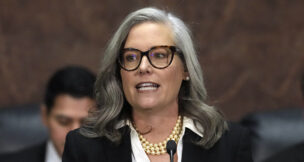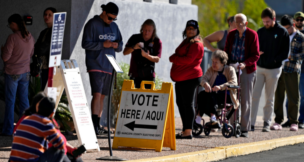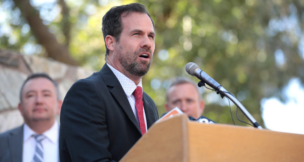Arizona Groundwater – a guide for decision making
Kyl Center for Water Policy, ASU Morrison Institute for Public Policy, Guest Commentary//February 28, 2025//
Arizona Groundwater – a guide for decision making
Kyl Center for Water Policy, ASU Morrison Institute for Public Policy, Guest Commentary//February 28, 2025//
Groundwater issues have come into sharp focus in Arizona. Shortage on the Colorado River increases the importance of protecting groundwater as the backup supply for cities in central Arizona, and new limitations on groundwater-reliant growth have sparked proposals for changes to groundwater management principles that have stood for 30 years. In some rural areas, communities are discussing how to protect groundwater for the long term.
What it is:
Groundwater is water that exists in sand, gravel and rock beneath the land surface. It fills the pores and fractures in these materials much the same way that water fills a sponge.
Why it matters:
Groundwater makes up 41% of Arizona’s water supply – more than surface water or Colorado River water.
Why it is finite:
In Arizona, most of the groundwater has been in place for tens of thousands of years. It is not replenished by rain and snow at any significant rate – certainly nowhere near the rate that we are capable of withdrawing it – and is often referred to as “fossil” groundwater.
Why management is essential:
- Like a savings account, continued withdrawal of groundwater will lead to its permanent depletion.
- If ‘fossil’ groundwater is pumped out faster than it is replaced naturally or through artificial recharge, pores in the alluvium once held open by water pressure will collapse, potentially causing land to subside and earth fissures to appear. In most cases, aquifer compaction is irreversible and the ability to store water is lost.
- Groundwater does not respect property boundaries. Without management, it is an ‘open access’ resource, meaning that any landowner can drill a well and deplete groundwater beneath his own land and also his neighbors’ land. Landowners with the deepest wells and the biggest pumps capture groundwater often to the detriment of others in the community.
- With one exception, the only aquifers in Arizona in which groundwater levels are increasing are within Active Management Areas, where groundwater use is regulated and recharged supplies are protected.
- Colorado River water is the predominant supply used to recharge and replenish aquifers. A shortage means less water will be available for this vital activity now and in the foreseeable future.
- Arizona’s economy depends on the state’s ability to provide reliable water supplies for homes and businesses now and into the future.
Why some oppose management:
- It is cheaper and easier to deplete groundwater than to manage it as a long-term sustainable supply, and political and economic pressures to make groundwater available for near-term gains persist.
Questions lawmakers should ask about proposed changes to groundwater laws:
- Is the proposed change likely to increase the amount of groundwater pumping over the long-term?
- Is the proposed change “net-zero” to the aquifer, meaning, is any proposed increase in groundwater pumping offset by recharge or replenishment in the same area as the groundwater pumping?
- To the extent the proposed change allows an entity to pump more groundwater now with the promise of replenishing it in the future, what is the likelihood that this “loan” from the aquifer can be repaid?
- Does the proposed change push costs away from special interests and onto everyone else?
- Does the proposed change signal uncertainty? Does it signal that Arizona is easing up on the assured water supply program, which provides consumer protection that water will not run out?
- Does the proposed change decrease the opportunity for future generations to thrive in Arizona?












































